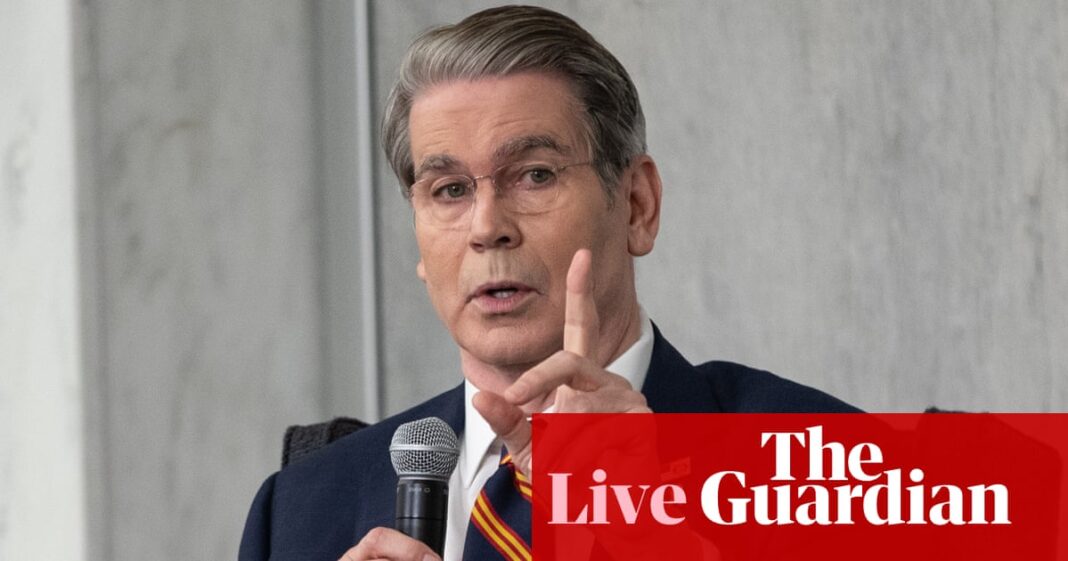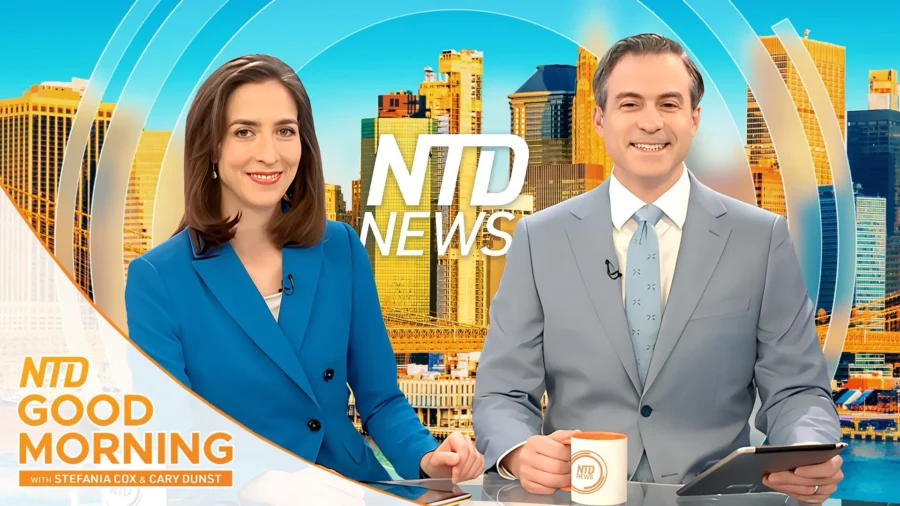Introduction: Scott Bessent accuses China of trying to damage global economy
Good morning, and welcome to our rolling coverage of business, the financial markets and the world economy.
Tensions between the US and China continue to swirl, even though fears of a renewed trade war cooled on Monday.
US treasury secretary Scott Bessent has thrown more fuel on the fire overnight, by accusing China of trying to hurt the world’s economy.
Bessent criticised Beijing for imposing new export controls on rare earths last week – a move which riled president Trump – suggesting the move would backfire.
He told the Financial Times:
“This is a sign of how weak their economy is, and they want to pull everybody else down with them. Maybe there is some Leninist business model where hurting your customers is a good idea, but they are the largest supplier to the world.
If they want to slow down the global economy, they will be hurt the most.”
Bessent’s comments come as the mood in the markets turns sour again, following a rally on Monday after Trump seemed to calm a situation which he inflamed on Friday by threatening China with 100% tariffs
Stock markets across the Asia-Pacific region are mainly in the red today, with China’s CSI 300 index down 0.6%, Hong Kong’s Hang Seng losing 1.2% and Japan’s Nikkei dropping by 2.1%.
Cryptocurrencies are also weakening, with Bitcoin dropping by 2.7% and ether shedding 5%.
The row threatens to overshadow the annual meetings of the World Bank Group (WBG) and the International Monetary Fund (IMF) which are taking place in Washington DC this week.
The agenda
-
7am BST: ONS labour market
-
8am BST: UK grocery inflation data
-
9am BST: IEA’s monthly oil market report
-
2pm BST: IMF World Economic Outlook press briefing
-
3.15pm BST: IMF’s Global Financial Stability Report
Key events
Rachel Reeves must avoid ‘Scrabble bag’ of tax rises, MPs hear
Rachel Reeves should avoid dipping into a ‘Scrabble bag’ of tax rises as she tries to close a funding shortfall in November’s budget, MPs have heard.
The Treasury committee is taking evidence from top experts about the chancellor’s tax options in the upcoming budget (you can watch the session here).
Dan Neidle, founder of Tax Policy Associates, tells the committee that Reeves has two choices if she decides to raise taxes. The wise way would be to raise one of the UK’s main taxes, or perhaps expand the base of VAT, moves that could break the Labour party’s manifesto pledges.
The less wise way, Neidle adds, is to raise the tax take “from picking from a Scrabble bag of lots of little, individual tax rises”.
This would be suboptimal, Neidle argues, as the UK has seen plenty of minute changes, here and there, to the tax system over the last 30 years.
He says:
Over that time the tax system has become more and more complex, accumulated more and more anomolies and political compromises that become baked in.
Every time you create 10 small tax rises or tax changes, you’re adding to that layer that have ossified our tax system. I very much hope she won’t do that.
Helen Miller, director of the Institute of Fiscal Studies, takes a similar line. She explains that Reeves could raise lots of additional tax revenues without breaking manifesto promises.
“Whatever Rachel Reeves decides to do, there’s a huge opportunity to reform taxes to improve ecoonomic growth.”
Yesterday, the IFS advised the chancellor to avoid “a half-baked dash for revenue” by stitching together unrelated tax-raising measures.
Ruth Curtis, CEO of the Resolution Foundation, says there is a strong case for raising taxes at this budget, pointing out that UK borrrowing costs are higher than other rich countries.
Curtis explains that in a world of low growth and sticky inflation, it is important that tax rises minimise the impact on growth and inflation.
Curtis also argues that the chancellor must thinnk about how the distribution of the pain of tax rises hits as the UK has barely emerged from cost of living crisis,
Dr Arun Advani, professor of economics at Warwick University, point out that if the spending side of budget is fixed, tax rises are the only thing left.
And in a move towards Neidle’s scrabble bag, Advani argues there are plenty of ways of raising taxes that also improve the tax system.
He points to areas where otherwise equal behaviour is treated differently by the tax system.
This creates complexity, scope for tax avoidance, and is very bad for economic efficiency and growth, Advani warns, adding:
Fixing those things would raise money while making the tax system better.
China hits back at US on shipping with Hanwha curbs
Shares in South Korean shipping giant Hanwha Ocean have dropped by 5.75% today after China sanctioned its US units and threatened further retaliatory measures on the industry.
Bloomberg reports:
The sanctions, targeting five US units of Hanwha Ocean Co., fueled a slump in global equities on Tuesday as traders dialed back hopes for an easing of tensions between the world’s largest economies….
In its announcements on Tuesday, China said it was looking into the impact of the US Trade Representative’s Section 301 investigation into the nation’s maritime sector, and may roll out more responses.
Hanwha Ocean’s subsidiaries assisted and supported investigative activities of the US government, thereby endangering China’s sovereignty, security and development interests, according to a commerce ministry statement.
Silver price hit record high in “almighty short squeeze”
Silver has hit a record high today, as US-China trade tensions fuel a dash into safe-haven assets.
Rising expectations of US interest rate cuts, and the on-going ‘debasement trade’, also helped to push silver to a record high of $53.60 per ounce.
Silver is also being pushed up by “an almighty short squeeze, and physical supply crunch,” reports Michael Brown, senior research strategist at Pepperstone.
Concerns about a lack of liquidity in London have sparked a worldwide hunt for silver, with benchmark prices soaring to near-unprecedented levels over New York, Bloomberg report.
European markets dip in risk-off mood
Europe’s stock markets have followed their lead from Asia, and dropped in early trading.
In London, the FTSE 100 share index has dropped by 30 points, or 0.3%, with mining companies leading the fallers.
There are larger losses in other markets, with Germany’s DAX down 1%, and France’s CAC dipping by 0.85%.
Victoria Scholar, head of investment at interactive investor, says:
“Trade tensions between the US and China are escalating as both countries started collecting port fees on shipping firms, pushing up costs on both sides. This has dashed global market sentiment with a sea of red across Europe after yesterday’s market reprieve.
US futures are pointing lower, reversing course after the S&P 500 logged its best day since May and the Nasdaq closed up 2.2%. Cryptocurrencies are selling off with bitcoin down over 3% and ether and solana both nursing losses of over 5% each. Oil is also caught up in the selling with brent down over 1%.”
Mediterranean Shipping Company has denied any involvement in the potential acquisition of a stake in British airline Easyjet (see earlier post) after reports it was considering a move.
A spokesperson told Reuters:
“MSC denies any involvement in this matter.”
The new port fees rolled out by the US and China today show that the trade war has “sailed into its next act”, says Stephen Innes, managing partner at SPI Asset Management, adding:
This time the battlefield isn’t cyberspace or chip fabs—it’s container ports. The U.S. and China have turned the world’s docks into toll booths.
EasyJet shares jump on report of interest from MSC
A flurry of takeover talk speculation has pushed up shares in budget airline EasyJet this morning.
EasyJet’s shares are up over 7%, leading the risers on the FTSE 100 share index.
The rally appears to be sparked by a story in Italian newspaper Corriere della Sera, which is reporting that global logistics giant Mediterranean Shipping Company is reportedly working in tandem with an investment fund about possibly investing in the airline, which is worth around £3.5bn..
According to Corriere della Sera, MSC has long wanted to add a passenger airline to its vast portfolio which includes ports, cruise ships and container ships, cargo carriers, and clinics.
Close Brothers lift motor finance scandal bill to £300m

Lauren Almeida
UK lender Close Brothers has put aside an extra £135m to deal with the motor finance scandal, as lenders grapple with the rising cost of potential compensation claims.
The company is one of many lenders exposed to an ongoing scandal in which drivers were overcharged for loans as a result of commission paid to car dealers. It has now made a total provision of £300m to deal with potential costs.
It follows a similar warning from Lloyds Bank yesterday, which announced it had made a further £800m provision to deal with the motor finance scandal, taking its total to almost £2bn.
Both lenders have updated their estimates following a consultation paper by the Financial Conduct Authority. But Close Brothers said this morning:
“[The group] does not believe the redress methodology proposed by the FCA appropriately reflects actual customer loss or achieves a proportionate outcome.
“…the FCA’s proposed approach to assessing unfairness does not align with the legal clarity provided by the supreme court judgement in respect of the “Johnson” case, which confirmed that the test for unfairness is highly fact specific and must take into account a broad range of factors. The group will continue to engage with the FCA in respect of these points.
This summer the supreme court sided with one of three consumer complaints related to car finance, with judges concerned about “unfair” treatment by car lenders towards Mark Johnson, a 35-year-old factory worker from south Wales.
An FCA spokesperson said:
“Many motor finance lenders did not comply with the law or the rules. It’s time their customers get fair compensation. Recent court judgments show that liabilities exist no matter what.
“We believe our scheme is the best way to settle the issue for both consumers and firms, and alternatives would be more costly and take longer. We recognise not everyone will get everything they would like. But it’s vital we draw a line under the issue so a trusted motor finance market can continue to serve millions of families every year.”
Shares in Close Brothers, which is listed in London, have dropped by 2% in early trading.
Pound falls after US jobs report
The pound is weakening this morning after new data showed a rise in UK unemployment, and a drop in numbers on company payrolls.
The UK jobless rate rose to 4.8% in the June-August quarter, the Office for National Statistics has reported, its highest level since 2021.
The ONS’s data also shows that regular wage growth dropped 4.7% in the quarter, down from 4.8% in the previous three months, a three-year low.
Average weekly earnings in the three months to August 2025 were up 4.7% on the year excluding bonuses, down slightly from 4.8% last month.
Including bonuses the rate was 5.0%, up from last month’s figure of 4.8%.
Read the release ➡ https://t.co/LxpFPc90Mb pic.twitter.com/nsPUZ6wxxS
— Office for National Statistics (ONS) (@ONS) October 14, 2025
Adding to the disappointing picture, the number of payrolled employees is estimated to have fallen by 10,000 in September, and by 100,000 over the last year.
In response, the pound has dropped by over half a cent against the US dollar to $1.3275, close to a two-month low.
Chris Beauchamp, chief market analyst at IG, says:
“This morning’s data provides little in the way of good news for the struggling UK economy, and puts more pressure on the Bank of England and the government to act to provide more support.
Sterling looks at the mercy of continued US dollar strength, both from a data outlook and as short positioning in the greenback continues to unwind.”
China has taken countermeasures against five U.S.-linked subsidiaries of South Korean shipbuilding firm Hanwha Ocean, Reuters reports.
Organisations and individuals within China are prohibited from engaging in any transactions, cooperation or related activities with these entities, the Chinese commerce ministry said on Tuesday.
China: If forced, we will fight to the end
China’s Ministry of Commerce has urged the US to work with Beijing, and to show sincerity in trade talks.
A spokesperson for the ministry said today:
“The U.S. side cannot seek talks on one hand while threatening to introduce new restrictive measures on the other. This is not the right way to get along with China.
“China’s position concerning tariff or trade wars has been consistent — if forced to fight, China will fight to the end, and for talks, the door is open.
Japan’s Nikkei index has closed for the day, down 2.58%, it’s biggest one-day fall since the market turmoil in April when Donald Trump kicked off his trade war.
Japan’s Nikkei Closes Down 2.58%, Biggest One-Day Drop Since April
— LiveSquawk (@LiveSquawk) October 14, 2025
Japanese investors are nervous about the domestic political situation, following a split between the ruling Liberal Democratic Party and the smaller Komeito party.
Last Friday, Komeito quit their coalition, a move which makes it harder for the LDP’s new leader, Sanae Takaichi, to become Japan’s next prime minister.
The US also began imposing tariffs on imported lumber, kitchen cabinets and some furniture today.
The new levies, announced by Donald Trump last month, will introduce a 10% tariff on imports of softwood lumber, while duties on certain upholstered furniture and kitchen cabinets start at 25%.
The White House claimed the duties will boost US industries and protect national security. But, as they’re paid by the importer, they risk pushing up the cost of building and fitting out a home.
Trump and Xi still on track for meeting, Bessennt says
Scott Bessent has also revealed that US president Donald Trump remains on track to meet Chinese leader Xi Jinping in South Korea in late October
Spealing to Fox Business, Bessent said:
“The 100% tariff does not have to happen. The relationship, despite this announcement last week, is good. Lines of communication have reopened, so we’ll see where it goes.”
“President Trump said that the tariffs would not go into effect until November 1. He will be meeting with Party Chair Xi in Korea. I believe that meeting will still be on.”
Bessent also claimed that “We have substantially de-escalated,” – shortly before appearing to re-escalate by accusing China of trying to damage the the global economy.
US and China to roll out tit-for-tat port fees today
A new front has opened up in the bubbling US-China trade tensions today too – at the two country’s ports.
From today, the US and China will begin charging additional port fees on ocean shipping firms.
China said today it had started to collect the special charges on U.S.-owned, operated, built, or flagged vessels. Chinese-built ships would be exempted from the levies, though.
The US is also scheduled to start collecting similar fees today on ships linked to China. This is an attempt to shake China’s grip on the global maritime industry and bolster U.S. shipbuilding.
Athens-based Xclusiv Shipbrokers Inc said in a research note:
“This tit-for-tat symmetry locks both economies into a spiral of maritime taxation that risks distorting global freight flows.”
Introduction: Scott Bessent accuses China of trying to damage global economy
Good morning, and welcome to our rolling coverage of business, the financial markets and the world economy.
Tensions between the US and China continue to swirl, even though fears of a renewed trade war cooled on Monday.
US treasury secretary Scott Bessent has thrown more fuel on the fire overnight, by accusing China of trying to hurt the world’s economy.
Bessent criticised Beijing for imposing new export controls on rare earths last week – a move which riled president Trump – suggesting the move would backfire.
He told the Financial Times:
“This is a sign of how weak their economy is, and they want to pull everybody else down with them. Maybe there is some Leninist business model where hurting your customers is a good idea, but they are the largest supplier to the world.
If they want to slow down the global economy, they will be hurt the most.”
Bessent’s comments come as the mood in the markets turns sour again, following a rally on Monday after Trump seemed to calm a situation which he inflamed on Friday by threatening China with 100% tariffs
Stock markets across the Asia-Pacific region are mainly in the red today, with China’s CSI 300 index down 0.6%, Hong Kong’s Hang Seng losing 1.2% and Japan’s Nikkei dropping by 2.1%.
Cryptocurrencies are also weakening, with Bitcoin dropping by 2.7% and ether shedding 5%.
The row threatens to overshadow the annual meetings of the World Bank Group (WBG) and the International Monetary Fund (IMF) which are taking place in Washington DC this week.
The agenda
-
7am BST: ONS labour market
-
8am BST: UK grocery inflation data
-
9am BST: IEA’s monthly oil market report
-
2pm BST: IMF World Economic Outlook press briefing
-
3.15pm BST: IMF’s Global Financial Stability Report


